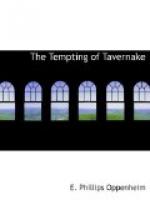“Take a bite of supper with me,” Nicholls answered. “In these serious affairs, my daughter has always her say. We will put the matter before her and see what she thinks of it.”
They lingered about the quay until the light from Wells Lighthouse flashed across the sea, and until in the distance they could hear the moaning of the incoming tide as it rippled over the bar and began to fill the tidal way which stretched to the wooden pier itself. Then the two men made their way along the village street, through a field, and into the little yard over which stood the sign of “Matthew Nicholls, Boat-Builder.” At one corner of the yard was the cottage in which he lived.
“You’ll come right in, Mr. Tavernake,” he said, the instincts of hospitality stirring within him as soon as they had passed through the gate. “We will talk of this matter together, you and me and the daughter.”
Tavernake seemed, on his introduction to the household, like a man unused to feminine society. Perhaps he did not expect to find such a type of her sex as Ruth Nicholls in such a remote neighborhood. She was thin, and her cheeks were paler than those of any of the other young women whom he had seen about the village. Her eyes, too, were darker, and her speech different. There was nothing about her which reminded him in the least of the child with whom he had played. Tavernake watched her intently. Presently the idea came to him that she, too, was seeking shelter.
Supper was a simple meal, but it was well and deftly served. The girl had the gift of moving noiselessly. She was quick without giving the impression of haste. To their guest she was courteous, but her recollection of him appeared to be slight, and his coming but a matter of slight interest. After she had cleared the cloth, however, and produced a jar of tobacco, her father bade her sit down with them.
“Mr. Tavernake,” he began, ponderously, “is thinking some of settling down in these parts, Ruth.”
She inclined her head gravely.
“It appears,” her father continued, “that he is sick and tired of the city and of head-work. He is wishful to come into the yard with me, if so be that we could find enough work for two.”
The girl looked at their visitor, and for the first time there was a measure of curiosity in her earnest gaze. Tavernake was, in his way, good enough to look upon. He was well-built, his shoulders and physique all spoke of strength. His features were firmly cut, although his general expression was gloomy. But for a certain moroseness, an uncouthness which he seemed to cultivate, he might even have been deemed good-looking.
“Mr. Tavernake would make a great mistake,” she said, hesitatingly. “It is not well for those who have brains to work with their hands. It is not a place for those to live who have been out in the world. At most seasons of the year it is but a wilderness. Sometimes there is little enough to do, even for father.”




